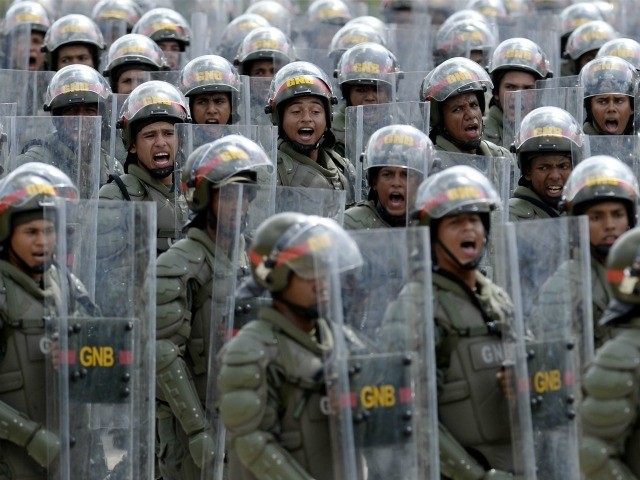With the anniversary of the arrest of opposition party leader Leopoldo López approaching, the Venezuelan government has approved new legislation which would allow the Bolivarian National Guard to use “potentially lethal force” against protesters calling for the fully free exercise of the freedoms of expression and assembly.
Spanish newspaper ABC reports that the new law, Resolution 0086610, allows for National Guard troops to use force against civilian protesters in certain situations. The law permits “the use of potentially lethal force, with a firearm or other potentially lethal weapon, in order to avoid disorder, support legitimately constituted authority, and reject any aggression, facing it immediately with the necessary means.”
The law defines lethal violence—the situation required for soldiers to use this force, as “the creation of a situation in which there is a lethal risk, against which the military officer will apply the use of potentially lethal force.”
Opponents of the new law note that the text reads as clearly incompatible with the Venezuelan Constitution and allows National Guard troops too much subjectivity in deciding when a situation allows for the use of lethal force, particularly given the history of abuse of peaceful protesters against the socialist Maduro regime in the past year.
Colombian newspaper El Tiempo notes that the Venezuelan Constitution clearly states that the government is barred from “the use of firearms or toxic substances to control peaceful demonstration.” The paper also cites opponents who argue that the new law serves only to dissuade the opposition from expressing itself. “The only interpretation one can make [of the new law] is that it is about intimidating the population and, in a way, impeding them from protesting. This is a death threat from the Minister [of Defense] to protesters and to those who are discontented,” said Roberto Briceño León, the head of the Venezuelan Observatory of Violence.
Speaking to the PanAm Post, Jose Vicente Haro, a Venezuelan university professor of constitutional law, argued that the new law may also defy international legal standards. As both the regional document establishing the right to protest—the American Convention on Human Rights—and the International Covenant on Civil and Political Rights, ban the use of violence to subdue peaceful protests, the Venezuelan government may be violating international law as well as its own constitution.
The PanAm post notes that, according to statistics from the Venezuelan Observatory for Social Conflict, Venezuelans staged an average of 26 protests a day in 2014, calling for the expansion of civil rights and an end to the socialist economic system that has caused shortages of everything from water, milk, and flour to coffins and breast implants. The protests reached a fever pitch in February 2014, when the leader of the democratic Popular Will Party, Leopoldo López, was arrested on “terrorism” charges for calling for free and fair elections in Venezuela. López remains in prison a year later, with little hope of a trial in the near future. Evidence has also surfaced implicating the Venezuelan government in tampering with case evidence.

COMMENTS
Please let us know if you're having issues with commenting.